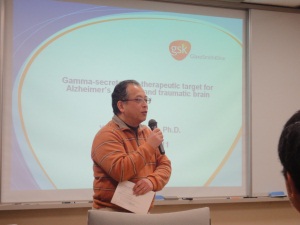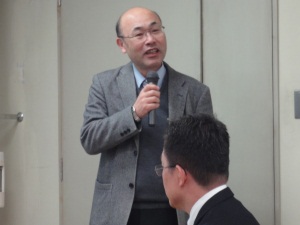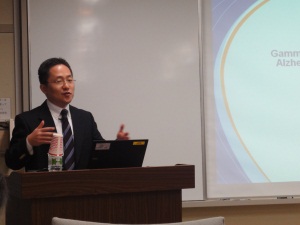| ★ |
|
・ |
| ・ | ★ |
Mar. 15, 2011 A seminar was held by Dr. Yasuji Matsuoka (Manager, Neural Pathway Discovery, GlaxoSmithKline, Singapore) entitled by "Gamma-secretase, a therapeutic target for Alzheimer's disease and traumatic brain injury".
<Abstract> Gamma-secretase is a key enzyme in generation of amyloid beta (Ab) and accumulation of Ab is a pathological hallmark of Alzheimer's disease (AD). Therefore, inhibition of g-secretase is a potential therapeutic target. Gamma-secretase has many (>40) substrates in addition to Ab precursor protein. Since some substrates, such as Notch, is a critical in physiological system, presumably, substrate selectivity is critical to gain desired safety profile. First generation g-secretase inhibitors (GSIs) have only limited (if there is any) substrate selectivity, and also induced paradoxical increase of Ab after transientreduction (Ab-rebound) in pre-clinical species and human. We investigated mechanism of Ab-rebound using GSI and g-secretase modulators (GSMs) which shift cleavage site and maintain cleavage of substrates. We found that an accumulation of g-secretase substrates is one of causes of GSI-mediated Ab-rebound. In combination of substrate selectivity, GSMs may be more useful Ab-lowering approach for treatment AD. Acute and transient increase of Ab is seen after traumatic brain injury in pre-clinical species and human. We hypothesized overproduction of Ab is one of causes of neurodegeneration and tested impact of Ab-lowering approach using GSI. Treatment with a GSI significantly reduced neurodegeneration and improved dysfunction. GSI and other Ab-lowering agents may be useful for treatment of traumatic brain injury. Reference Loane, D.J., Pocivavsek, A., Moussa, C. E-H., Thompson, R., Matsuoka, Y., Faden, A.I., Rebeck, G.W., Burns, M.P. (2009) APP secretases as therapeutic targets for traumatic brain injury. Nature Medicine, 15: 377-379. |
||||||


